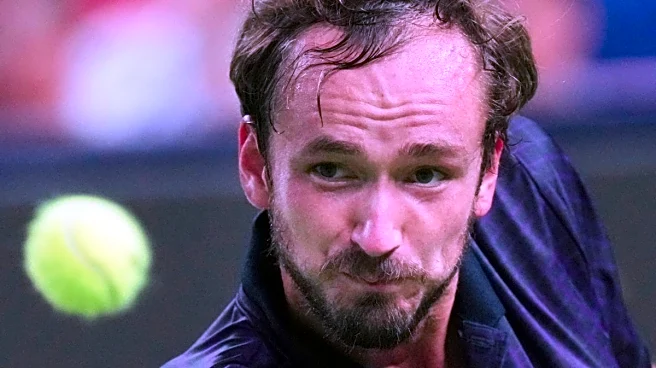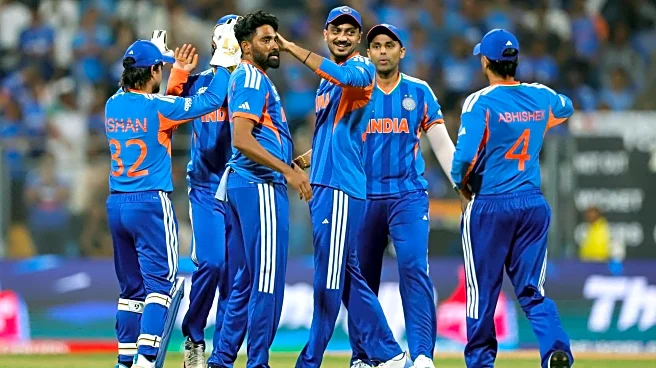Daniil Medvedev expressed satisfaction at displaying “signs of my previous self” after the former world number one comfortably defeated Alex de Minaur 6-4, 6-4 on Friday, advancing to the semi-finals of the Shanghai Masters.
The Russian is set to compete against unseeded Arthur Rinderknech, who secured a significant victory against Canada’s Felix Auger-Aliassime, 6-3, 6-4, thus joining his cousin Valentin Vacherot in the last four.
Ranked 204th, Vacherot will face four-time Shanghai champion Novak Djokovic in the other semi-final match.
Medvedev, now ranked 18th, expressed his delight after enduring “a very tough year.”
“I’m happy that at this moment I’m showcasing some great tennis, some great signs of my previous self — or my new self — and just
looking forward to the next round.”
Medvedev broke world number seven De Minaur in the fifth game and managed to hold despite a shaky 10th game where he saved a breakpoint and committed three double-faults.
Although De Minaur had his moments, the Australian appeared somewhat off, unable to capitalize on opportunities. A series of errors in the ninth game handed Medvedev the second set, which he sealed with an ace.
France’s Rinderknech is the next challenge for Medvedev in his quest for a second Shanghai title, having previously won in 2019.
“He’s a very tough opponent because he’s the type of player who, when his game is on, he can beat anyone,” Medvedev remarked.
Cousins in last four
Rinderknech, ranked 54 at the tournament’s start, has had a remarkable run in Shanghai, including a victory over world number three Alexander Zverev.
The 30-year-old’s success is mirrored by his cousin, Monaco’s Vacherot, who secured his semi-final spot by defeating Denmark’s Holger Rune.
Rinderknech made short work of 13th-ranked Auger-Aliassime, breaking in the sixth game with a down-the-line winner.
He began the second set assertively, breaking in the first game to ensure the Canadian never gained momentum.
“Sometimes you like to win ugly, and today I thought it was a pretty good-looking win,” Rinderknech joked.
He mentioned that his own quarter-final match was far less stressful than watching Vacherot’s the day before.
“I’m not used to watching someone and really wanting them to win so badly,” he said.
“It was a lot easier for me to be on court today, just controlling my emotions and doing my own thing.”
He shared that his family WhatsApp group was “burning.”
“Everyone is just living the little dream we are in, Val and I, so it’s really enjoyable.”
Sabalenka marches into Wuhan semis
Aryna Sabalenka advanced to her 11th semi-final this year with a 6-3, 6-3 triumph over Elena Rybakina at the Wuhan Open on Friday. Meanwhile, Jasmine Paolini delivered a stunning performance to defeat Iga Swiatek in just 65 minutes.
World number one Sabalenka remains unbeaten in four appearances at this event, carrying a flawless 20-0 record into her clash with Jessica Pegula on Saturday.
Coco Gauff also secured victory, defeating Laura Siegemund 6-3, 6-0 to reach the semi-finals in Wuhan for the second consecutive year. The American third seed will face Italy’s seventh seed Paolini, who surprised world number two Swiatek with a commanding 6-1, 6-2 win. This marked Paolini’s first victory against Swiatek in their seven meetings.
Defending champion Sabalenka improved her head-to-head record to 8-5 against Kazakhstan’s Rybakina, impacting Rybakina’s chances for a WTA Finals spot. Sabalenka expressed her respect for Rybakina, acknowledging their tough matches and her satisfaction with her performance.
Sabalenka claimed a crucial break in the eighth game of the first set, taking the lead in 43 minutes in temperatures exceeding 30 °C. Demonstrating her all-court prowess, Sabalenka broke twice in the second set to establish a 4-1 lead. Though Rybakina fought back with one break, Sabalenka secured her spot in the final four, extending her winning streak to 10 matches.
Sixth-seeded Pegula achieved her 50th victory of the season with a 2-6, 6-0, 6-3 win over Katerina Siniakova, reaching her third consecutive semi-final after Beijing and the US Open. Pegula’s last seven matches were all three-setters within a 16-day span, winning six of them. She commented on her physical condition and her ability to battle through matches.
Pegula’s left thigh was taped during her quarter-final, but she mentioned it was a precaution due to playing many long matches. Unlike Pegula, Gauff has been dominant, dropping only nine games in three rounds in Wuhan. The 21-year-old from Florida converted five out of eight break points against Siegemund, completing her victory in 85 minutes. Gauff noted her improved ability to capitalise on chances in the second set.


/images/ppid_59c68470-image-1770817534750327.webp)







/images/ppid_a911dc6a-image-177081843992562316.webp)

/images/ppid_a911dc6a-image-177081803750877941.webp)
/images/ppid_a911dc6a-image-177081807334432740.webp)
/images/ppid_a911dc6a-image-177081811082158717.webp)
/images/ppid_a911dc6a-image-177081802823068201.webp)
/images/ppid_a911dc6a-image-177081803671793308.webp)
/images/ppid_59c68470-image-177081754567635886.webp)
